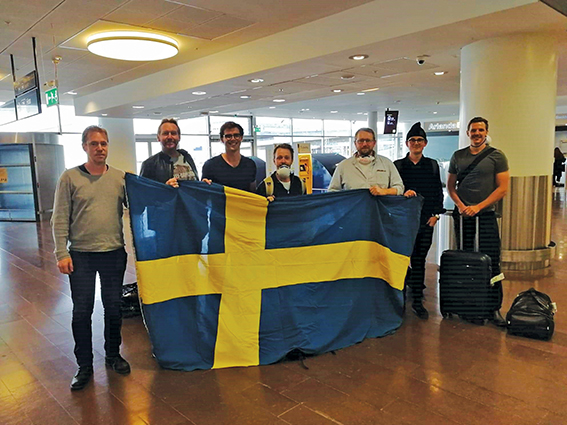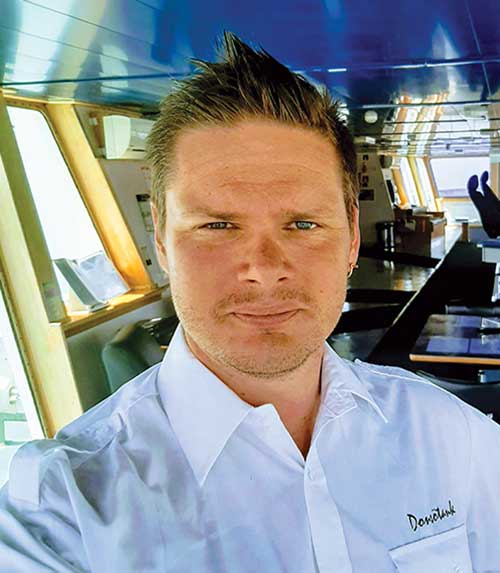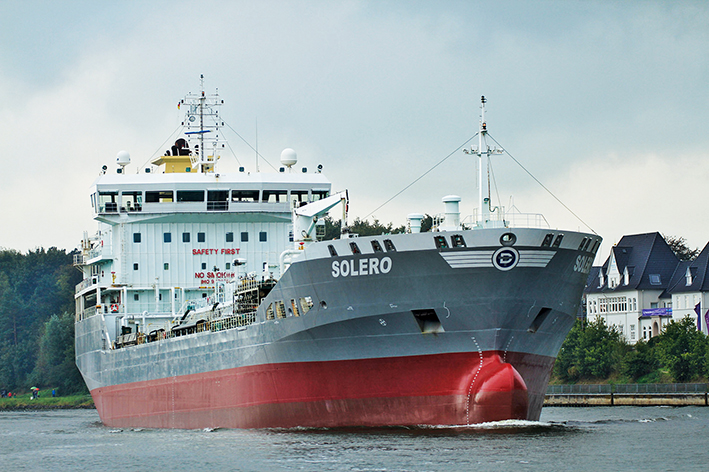- Topics
- Campaigning
- Careers
- Colleges
- Community
- Education and training
- Environment
- Equality
- Federation
- General secretary message
- Government
- Health and safety
- History
- Industrial
- International
- Law
- Members at work
- Nautilus news
- Nautilus partnerships
- Netherlands
- Open days
- Opinion
- Organising
- Podcasts from Nautilus
- Sponsored content
- Switzerland
- Technology
- Ukraine
- United Kingdom
- Welfare
A coordinated effort by Swedish officials successfully enables crew change in Barcelona as European border restrictions put brakes on freedom of travel
22 May 2020

A coordinated effort by Swedish officials successfully enables crew change in Barcelona as European border restrictions put brakes on freedom of travel, reports Andrew Draper
A co-ordinated effort by Swedish officials resulted in a successful changeover of crew in Barcelona for Donsötank oil and chemical tanker Solero, after numerous ports in the Mediterranean had denied the Swedish ship permission to dock with a view to changing personnel ‒ based on a fear of spreading coronavirus.
Seven of the 14-member crew onboard the Swedish-flag vessel Solero were successfully changed over in Barcelona on 23 April in a complex operation involving an array of bodies and senior shipping and government officials.
Donsötank HR director Martin Sander says his company was supported by the Swedish Shipowners' Association (SSA), the Swedish government, including the foreign ministry and the country's embassy in Madrid. Even the European Commission was brought in as the principle of freedom of movement was sought to be upheld.
Mr Sander tells the Telegraph that seven Swedes of the 14-member crew were changed over: Normally, we trade in northern Europe, the Baltic and so on and can do crew changes when the vessels pass Sweden. Sometimes, as in this case in the Mediterranean, we weren't so lucky. 'The Donsötank crews normally work four weeks on and four weeks off.
Initially, Donsötank asked the Maltese authorities for permission to dock and change crew, but had a brush-off and requirement that the crews enter quarantine for two weeks. Italy rejected any notion of a change-over, as did Mallorca and France. Barcelona seemed a possibility but was ruled out by authorities initially.
By this time the Swedish crew had been at sea for around eight weeks and were desperate to get home to their families. 'We tried in every port to get them home, but they always denied us, 'Mr Sander says. 'So, we called on our government and got some help from them.'
That led to a broad effort to achieve the desired outcome. The SSA worked alongside the Swedish Transport Agency, which helped push through the crew changes. The SSA's Carl Carlsson, who is in charge of safety at sea, says while it is getting many requests from owners wanting help with crew changes, Solero's was successful because several factors fell into place. This included the availability of scheduled flights and the presence of a Swedish embassy.
A regular scheduled flight was available each way between Stockholm and Barcelona, with an overnight stopover in Frankfurt. Mr Sander says the flight was almost empty, with 10 people on the plane. That made social distancing possible.
A few intensive days (and nights) of work ensued, involving officials working at the transport agency, the prime minister's office, foreign ministry, the embassy in Madrid and the European Commission.
Mr Sander knows the strain the company's seafarers are under. 'It's challenging for these seafarers. They have families at home, kid's home from school, and also working at home, so there's really big stress at home for the seafarers. It's important we keep giving good vibes during the lockdown. The news is so negative, we try to give some positive energy.'
Mikael Huss, director of the SBF officers' union, says in the leader of the union's May magazine that changing crews has proven a near impossible task for owners. Ports everywhere are closed; taxis and buses are not running, and flights are few and far between.
'The problem is two-fold and very difficult to resolve,' he says. 'Those onboard of course want to get home when their tour of duty is done, but they are usually anxious about the journey itself, especially as travelling has been advised against by the authorities. They live and exist in their own infection-free world onboard and don't want to risk meeting people. The infection is of course found ashore. Do we dare risk taking the pilot onboard, do port officials, classification society people and all others come on board too? This is the question no one can get answers to right now, not for the moment anyway.'
SBF has provided certification, with the support of the International Transport Workers' Federation (ITF) and International Chamber of Shipping (ICS), showing that seafarers should receive exemption from travel bans on the grounds that they are carrying out essential work.
'Unfortunately, this document doesn't always help when seafarers need to try to travel between home and vessel or vice versa. There are of course many officials in positions of power who have the right to interpret this and thereby decide the possibility for seafarers to travel out or home.'
Mr Huss says that, on top of this, shipowners are applying their own interpretations. Some owners have put a stop to changeovers to save themselves the extra effort, while others say it is to protect crews from infection.
'SBF can't force a shipowner to organise travel which they claim may expose our members to danger.This is regardless of whether there are good intentions or not from the employer.'
He adds that people will remember how their companies acted when this crisis is over. 'Those companies who take care of their people and try to do all they can to save their jobs, help them carry out crew change-overs in the best possible way and prevent them from becoming infected will be rewarded with loyal employees when the crisis passes. Those companies who, on the other hand, choose another path are showing their true colours and can reckon on their staff remembering this when things are back to normal and shortage of staff is a reality.'
The Swedish government has banned non-essential travel to Sweden from all countries except European Union member states, the UK, Norway, Iceland, Liechtenstein and Switzerland. This does not apply to Swedish citizens, third-country nationals or those travelling with an essential function or need.
The Swedish Transport Agency has also agreed to a six-month extension of seafarers' expiring certificates of competency (CoC) and/or certificates of proficiency (CoP) and ships' statutory certificates. The agency will also grant dispensation for 'specified seafarers' to serve in a capacity for which they do not hold the appropriate certificate for no longer than six months.
If there is an urgent need or force majeure preventing safe crewing, the agency says the ship master has the authority to decide that the ship may undertake a voyage even if the crew does not comply with the requirements, under certain conditions. These include sudden cases of illness in the crew and where the deficiency cannot be rectified before the ship's planned departure. The ship's existing crew must be composed in such a way that the ship's safe navigation and all other aspects of maritime safety are satisfactorily met. Such decisions do not require any written approval by the Swedish Transport Agency in order to be valid.
On 6 May, the International Maritime Organization (IMO) issued a statement drawn up in conjunction with industry bodies, including the unions, setting out what they call a '12-step solution for governments to free seafarers from Covid-19 lockdown'.
The IMO says it is a comprehensive blueprint as to how governments can facilitate crew change-overs and resolve safety concerns throughout the entire process. 'In two weeks', time, approximately 150,000 merchant seafarers will need to be changed over to ensure compliance with international maritime regulations, with tens of thousands currently trapped onboard ships across the globe due to the continuing imposition of travel restrictions. Failure to do so risks the wellbeing of seafarers, maritime safety, as well as the supply chains that the world relies on,' it states.
Steve Cotton, general secretary of the ITF, says: 'International seafarers are bearing the burden first-hand as governments turn a blind eye to the "forgotten sector"'. The ITF, ICS and IMO have a clear message: governments cannot continue with a mentality of out of sight, out of mind, and we strongly urge governments to use this roadmap to act now before we suffer more serious consequences.'
Guy Platten, secretary general of the ICS says: 'The problem is simplistic, but the solution is complex. Seafarers continue to work really hard, day in, day out and far away from loved ones, but if we are not able to free our seafarers from their Covid-19 lockdown we could start to see disruption to trade. and more importantly we increase the risk of accident and occurrences of mental health issues. Putting this off is no longer an option. '
We tried in every port to get them home, but they always denied us.So, we called on our government and got some help from them. Donsötank HR director Martin Sander
Social distancing and sanitiser
Fredrik Hammarskär, the 36-year-old master of the Solero, pictured, tells the Telegraph that when he set off from his home village of Ljungskile some 80 km north of Gothenburg, he was far from certain that he was going to get to the vessel.

'When we started out from Gothenburg by car, they weren't sure that it would all work throughout Europe. Everyone was a bit worried about this. But it turned out to be much better than expected.' The journey door to door took 28 hours and included an overnight stay in a Frankfurt hotel. He says usually they leave the airport in the morning and sign on the same day almost anywhere in Europe. A hotel is needed only if there is an unexpected delay.
He says the crew members all carried a 'Letter of Guarantee' confirming their status as key workers essential to the transport supply chain in Europe, but did not need to show it at the airport. They just explained they were not tourists going on holiday and that was enough. The document was issued by Donsötank.
The authorities were helpful, he says. 'When there was pressure from the European Commission, the Swedish Transport Agency and the embassy in Madrid that the crew should have freedom of movement, they didn't have much choice but to let us do it.'
He expects to be onboard for the next six weeks, but if there is the opportunity to change the crew earlier, they will arrange that. It depends on where the ship is at the time. 'It seems that in Rotterdam and the Scandinavian ports [crew changes are] still doable.' Gothenburg, Malmö and Hamburg are promising options for crew changes, he says.
Mr Hammarskär says the crew is doing its best to follow social distancing and has the personal protective equipment it needs (gloves, masks and hand sanitiser) to increase safety. The biggest risk to them is people coming onboard.
Since leaving Madrid, they've largely avoided people coming onboard and things have been done remotely. A pilot boarded in Cartagena for arrival and departure, but 'was aware there probably was no infection onboard'.
The crew is doing its best to follow guidelines from the Swedish health authorities and the International Transport Workers' Federation (ITF). 'We eat in the same room ‒ we don't have much choice ‒ but everyone just keeps to a stricter hygiene routine and we're trying to keep a little more apart than usual.'
Algeria posed more of a challenge when they called there, he says, as officials insisted on boarding the ship.
'It's a different culture and different understanding of the problem,' he says.

One ship, two deals
Unlike their Swedish counterparts, the Solero's Filipino crew members have mostly remained onboard, as they are on six-month contracts and are not due to change over until the summer, Donsötank HR Director Martin Sander said.
'Most of them like to stay onboard as it's so difficult to come onboard again. They are staying onboard and are working. We will see what happens.' Before the pandemic took hold, the company decided to allow some Filipinos to sign on and replace other crew members early to retain fresh crews. Some 20,000 Filipinos have returned home, with a further 2,000 a day arriving whenever possible. Most of this number are seafarers.
Tags
More articles
Union pledges to defend seafarers' jobs now and in the future
Still serving seafarers – an ITF inspector adapts to life under the Covid-19 pandemic
No mandatory quarantine for seafarers in Britain
Seafarers will be exempted from planned travel restrictions that could include a mandatory 14-day quarantine for visitors and residents returning to the UK.
Add your voice – Nautilus member urges others to join the campaign on crew relief and repatriation in the Covid-19 pandemic
Union pledges to defend seafarers' jobs now and in the future
Wherever you are, so are we over the May Bank Holiday
Nautilus knows its members are key workers busy keeping ports open and trade and people moving during the global Covid-19 pandemic.
